

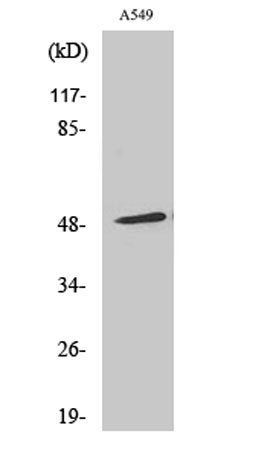
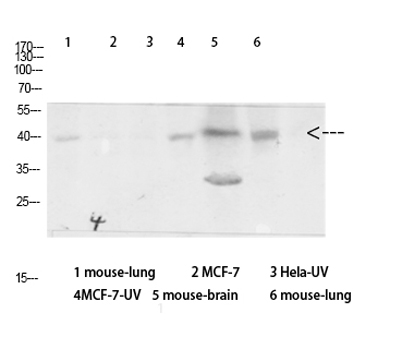
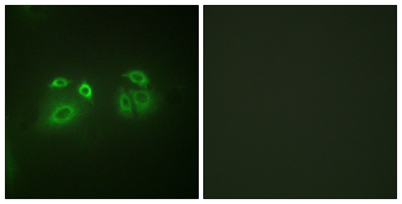
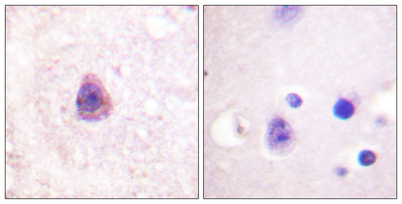
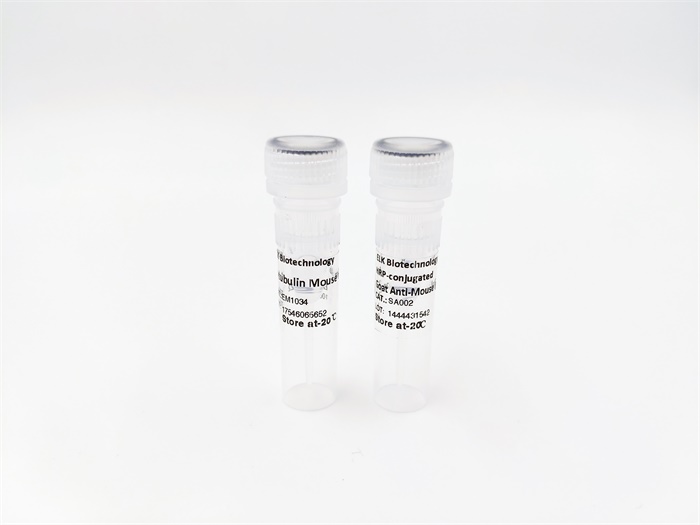



Arrestin-β-1 rabbit pAb
 One-click to copy product information
One-click to copy product information$148.00/50µL $248.00/100µL
| 50 µL | $148.00 |
| 100 µL | $248.00 |
Overview
| Product name: | Arrestin-β-1 rabbit pAb |
| Reactivity: | Human;Monkey |
| Alternative Names: | ARRB1; ARR1; Beta-arrestin-1; Arrestin beta-1 |
| Source: | Rabbit |
| Dilutions: | Western Blot: 1/500 - 1/2000. Immunohistochemistry: 1/100 - 1/300. Immunofluorescence: 1/200 - 1/1000. ELISA: 1/10000. Not yet tested in other applications. |
| Immunogen: | The antiserum was produced against synthesized peptide derived from human Arrestin 1. AA range:369-418 |
| Storage: | -20°C/1 year |
| Clonality: | Polyclonal |
| Isotype: | IgG |
| Concentration: | 1 mg/ml |
| Observed Band: | 47kD |
| GeneID: | 408 |
| Human Swiss-Prot No: | P49407 |
| Cellular localization: | Cytoplasm. Nucleus. Cell membrane. Membrane, clathrin-coated pit . Cell projection, pseudopodium . Cytoplasmic vesicle. Translocates to the plasma membrane and colocalizes with antagonist-stimulated GPCRs. The monomeric form is predominantly located in the nucleus. The oligomeric form is located in the cytoplasm. Translocates to the nucleus upon stimulation of OPRD1 (By similarity). . |
| Background: | Members of arrestin/beta-arrestin protein family are thought to participate in agonist-mediated desensitization of G-protein-coupled receptors and cause specific dampening of cellular responses to stimuli such as hormones, neurotransmitters, or sensory signals. Arrestin beta 1 is a cytosolic protein and acts as a cofactor in the beta-adrenergic receptor kinase (BARK) mediated desensitization of beta-adrenergic receptors. Besides the central nervous system, it is expressed at high levels in peripheral blood leukocytes, and thus the BARK/beta-arrestin system is believed to play a major role in regulating receptor-mediated immune functions. Alternatively spliced transcripts encoding different isoforms of arrestin beta 1 have been described. [provided by RefSeq, Jan 2011], |
-
 Western Blot analysis of various cells using Arrestin-β-1 Polyclonal Antibody diluted at 1:500
Western Blot analysis of various cells using Arrestin-β-1 Polyclonal Antibody diluted at 1:500 -
 Western Blot analysis of various cells using Antibody diluted at 1:1000. Secondary antibody(catalog#:RS0002) was diluted at 1:20000
Western Blot analysis of various cells using Antibody diluted at 1:1000. Secondary antibody(catalog#:RS0002) was diluted at 1:20000 -
 Immunofluorescence analysis of A549 cells, using Arrestin 1 Antibody. The picture on the right is blocked with the synthesized peptide.
Immunofluorescence analysis of A549 cells, using Arrestin 1 Antibody. The picture on the right is blocked with the synthesized peptide. -
 Immunohistochemistry analysis of paraffin-embedded human brain tissue, using Arrestin 1 Antibody. The picture on the right is blocked with the synthesized peptide.
Immunohistochemistry analysis of paraffin-embedded human brain tissue, using Arrestin 1 Antibody. The picture on the right is blocked with the synthesized peptide.

 Manual
Manual